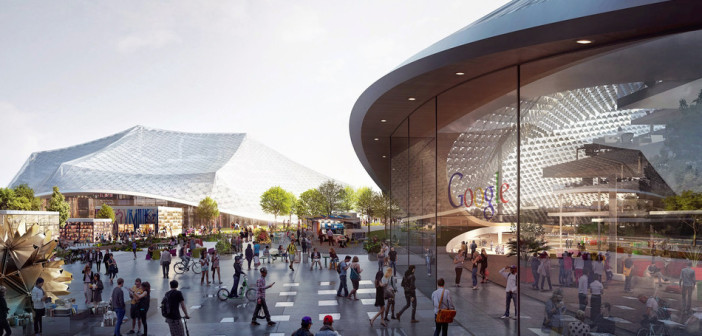From search to mobile to self-driving cars, Google’s futuristic ambitions seem limitless — and that attitude now also applies to commercial real estate.
The tech giant on Friday unveiled an ambitious proposal that re-imagines its Mountain View, California headquarters, long known as the Googleplex, into a utopian sprawl across 500 acres north of Highway 101. According to the 225-page document, Google teamed up with Danish architect Bjarke Ingels for the new campus design, which groups Google employees into glass, canopy-like structures the size of a city block. The additional 2.5 million square feet of office space would be enough for 12,500 more Google employees. Even more radical: those mammoth structures are modular.
Small cranes and robots will reconfigure the corporate buildings by moving around floors, walls and ceilings, in just a few hours. The make-it-yourself design also seems like a nod to Google’s open-source approach. For years, the company has made its popular Android operating system easy for developers to modify into heavily customized versions — even giants such as Amazon with its Fire phone, HTC and its Sense interface and Chinese smartphone maker Xiaomi.
The architectural designs are so ambitious; Google stated that some of the technology needed to operate the new offices doesn’t even exist yet. In other words, don’t expect the first canopy-like structure for another five years, at least. Google is the latest in a string of big tech companies growing their geographic footprints in Silicon Valley. Facebook’s new 430,000-square-foot building in Menlo Park, designed by famed Canadian architect Frank Gehry, will sport a green roof with more than 350 trees when it wraps construction later this year.
Meanwhile, excitement for Apple’s new spaceship-like campus, opening in Cupertino by late 2016, approaches a feverish state usually reserved for a new iPhone. Google might also argue that a larger presence — one that could mean hiring up to 12,500 additional workers — is ultimately a boon for the Bay Area economy. “It’s certainly a balance, and not without its downsides, as a city and corporate campus grows,” a former senior Google employee told Mashable. “Some small businesses may suffer, such as those serving lunch for a workforce that is increasingly fed by their employer, but most benefit since the population and needs in and around the campus increase. Google has to be thoughtful about this expansion and work with the city, but net-net, this is a good thing and the same challenge every city sees as they grow and expand.”
“Google is a tremendously thoughtful neighbour and citizen,” another ex-Googler added. “Its proposed HQ expansion seems like an exciting opportunity for both Google and the Mountain View community.” Still some locals aren’t thrilled about tech giants grabbing more space. Two small business owners in Mountain View Mashable spoke to on condition of anonymity expressed concern they would essentially be “pushed out” because they can’t keep pace with rising real estate costs.
Meanwhile, a group of residents who identify themselves politically as “residentialists” favor slower real estate growth and building smaller buildings to preserve Palo Alto’s quality of life. Three residentialists serve on the Palo Alto City Council today. Obviously, their views don’t exactly jive with the tech industry, which often emphasizes speed and innovation. For Google, however, the message from its proposal is clear: Bring on the canopies.




